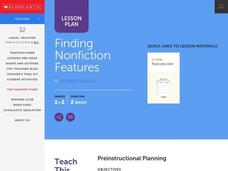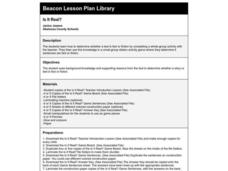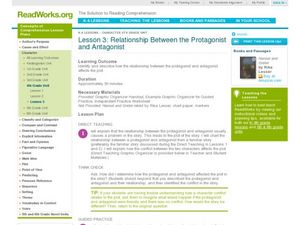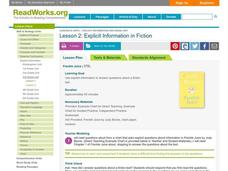Curated OER
Finding Nonfiction Features
Young scholars review the differences between a fiction and non-fiction book. In groups, they use different non-fiction books to identify the eleven features that distinguish it from a fiction book. To end the lesson, they create a...
Curated OER
Comparing Fiction and Nonfiction
Fifth graders compare and contrast an informational article with a fictional story. They read the story "The Contest" as a class, and discuss the different types of literature genres. Next, they complete a vocabulary worksheet and a...
Curated OER
TELL THE SEQUENCE IN AN ORAL REPORT
Second graders survey a favorite story he/she has read or heard read aloud. They use the graphic organizer to draw illustrations that show the beginning, middle and end of the story. They tell the title of the story, whether it is...
Curated OER
We Like to Imagine - Animals
Students describe a pretend animal. They read "The After School Monster." Students read other books and discuss whether or not the characters are real. Students make a drawing of a pretend animal and of a real animal. They make up a...
Curated OER
Friendship
Learners investigate the concept of friendship as part of a four lessons unit which integrates literature with language arts, family life, social studies, or religious studies. Peace, cooperation, social justice, and multicultural...
Curated OER
Is It Real?
First graders see how to determine whether a text is fact or fiction by completing a whole-group activity with the teacher. They use this knowledge in a small-group station activity game where they determine if sentences are fact or...
Curated OER
Is It Moose-Mooses or Moose-Meese?
Learners play librarian and have to shelve books on moose after determining whether the books are fiction or non-fiction. They must study Alaska and follow a format of questions to determine where to shelve the books.
Curated OER
Context Clues, Plot Structure, Conflict, and Personal Narrative Essay
What are the elements of a personal narrative? Get your class talking by reading "The Necklace" and "A Dangerous Game." The lesson focuses primarily on defining certain vocabulary terms (like context clues, plot, conflict, climax, etc.)...
Curated OER
Hattie and the Fox
Who is Hattie? Youngsters explore animal characteristics by reading poems and stories in class. They read the book Hattie and the Fox about a fictitious fox and his drama with the other farm animals. Then they reread the story over...
Curated OER
Lesson Plan 1: Introducing NaNo and Novels
Did you know that November is Novel Writing Month? In the first of a series of lessons, class members are introduced to the NaNoWriMo (National Novel Writing Month) project.
Curated OER
Predator Book Quiz
In this fiction books worksheet, students complete 7 multiple choice questions about the book, "Predator." These questions contain concepts such as choosing the correct author, who published the book, when it was on the New York Times...
Curated OER
Comparing and Contrasting Fiction and Nonfiction Using Graphic Organizers
Students compare and contrast fiction and non-fiction selections. In this writing skills lesson, students use different forms of graphic organizers to compare "The Three Little Pigs," to Wiesel's Night.
Curated OER
Relationship Between the Protagonist and Antagonist
Students read Hansel and Gretel, and discuss the conflict in the story, while determining who the protagonist and the antagonist are. In this fiction lesson, students chart the conflict in the story they have just read.
Curated OER
Explicit Information in Fiction
Second graders analyze the use of explicit information in fictional texts. In this language arts lesson, 2nd graders read a story and use the text to answer questions.
Curated OER
Using Chapter Titles to Determine the Main Idea
Second graders listen to the passage titled Pumpkin Picking and identify the main idea based on the title. In this main idea lesson plan, 2nd graders discuss how the title of a book or chapter sets the tone for the reading.
Curated OER
Explicit Information in Fiction
Third graders read the story Freckle Juice and answer short answer questions by providing explicit information. In this explicit information worksheet, 3rd graders do this for chapters 3, 4, and 5.
Curated OER
Causes
What makes someone cry? Little learners read the story, Why Do You Cry?: Not a Sob Story by Kate Klise to discover a bit about crying and a bit about cause and effect. They'll fill out a cause and effect chart while they discuss and...
Curated OER
Creating a Chapter Title
Second graders identify the main idea of a selection of text. In this creating a chapter title instructional activity, 2nd graders discuss how to find the main idea of a chapter, listen to a chapter read aloud, and create a title with...
Curated OER
Identifying Information from Fiction
A solid comprehension strategy is used to aid learners in better understanding what they read. They are introduced to the way good readers ask questions while their reading to understand what's going on in a story. The class reads...
Curated OER
Fiction vs. Nonfiction
Students find the difference between fiction and nonfiction. In this fiction/nonfiction lesson, 1st graders read the story Johnny Appleseed and discuss what makes this a nonfiction story. They listen to a fiction story and see what...
Curated OER
Fact or Fiction?
In this fact or fiction worksheet, students answer short answer questions and write one fact and one fiction sentence for each. Students complete 5 questions.
Curated OER
Listen to Poems and Rhyme
Students create rhymes. In this rhyming lesson students supply rhymes for Bringing the Rain to Kapiti Plain. The students group words according to rhyming patterns.
Curated OER
Comparing Realistic and Fictional Settings
Students explore The Hound of the Baskerville's by Sir Arthur Conan Doyle. In this literature lesson, students read the book and write down the main facts about the settings. Students write an essay about realistic settings and compare...
Curated OER
Pic-A-Fic: Choosing Fiction for Every Taste
Sixth graders examine and categorize a selection of title representing fiction genres. In this fiction genres lesson, 6th graders analyze and identify a variety of titles in the fiction genre. Students then find these types of fiction...

























